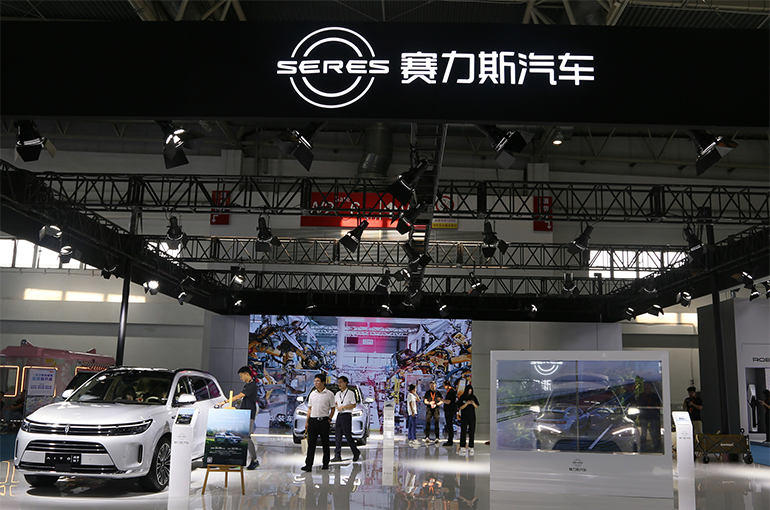 Chinese EV Maker Seres Makes First Profit on Surging Sales of Huawei Co-Developed Cars
Chinese EV Maker Seres Makes First Profit on Surging Sales of Huawei Co-Developed Cars(Yicai) July 10 -- Seres Group expects to have turned a profit for the first time ever because of strong sales of the Aito electric vehicles it co-developed with Huawei Technologies. Seres had been in the red for four straight years, losing almost CNY10 billion (USD1.37 billion).
Net profit was likely CNY1.7 billion (USD233.7 million) in the six months ended June 30, versus a CNY1.3 billion net loss a year earlier, the Chongqing-based automaker said in an earnings update released late yesterday. Revenue is seen at as much as CNY66 billion (USD9.1 billion), a six-fold increase.
Shares of Seres [SHA: 601127] slid 4.7 percent to close at CNY85.20 (USD11.71) apiece in Shanghai today. The stock has gained almost 12 percent so far this year.
The tie-up between Seres and Huawei, announced in April 2021, combines the carmaker’s expertise in EV production with the technological and innovation capabilities of the telecom and consumer electronics giant, including in smart car solutions, self-driving, and connectivity. Together they created the Aito EV brand.
Seres sold 200,949 Aito vehicles in the first half, a more than five-fold increase on a year ago. Sales of the premium M9 model in particular helped to bring Seres to profit, the company noted. It aims to sell 600,000 in 2024, according to media reports earlier this year.
JAC, BAIC BluePark Earnings
Two of the three other automakers that have partnerships with Huawei -- BAIC BluePark New Energy Technology, Chery Automobile, and Jianghuai Automobile Group, better known as JAC Motors -- also released first-half earnings updates yesterday.
JAC’s net profit likely surged 87 percent to CNY290 million (USD39.9 million) thanks to an optimized debt structure and lower interest rates on loans, the Hefei-based company said. JAC sold 13,000 new energy vehicles between January and June, a 15 percent rise.
The first model resulting from its cooperation with Shenzhen-based Huawei is expected to be priced at around CNY1 million (USD137,447) when released in the fourth quarter.
BAIC BluePark said it expects the carmaker’s net loss to have widened by as much as 35 percent to CNY2.7 billion, mainly because most of the models it created with Huawei have yet to hit the market.
Price War
The intense price competition in China’s NEV market is squeezing BAIC BluePark’s profit margin and pushing the Beijing-based company to invest heavily in research and development and brand channel building to drive the high-end development of its products, the firm noted.
BAIC BluePark sold 28,000 cars in the first half, down 20 percent from a year earlier. The Stelato S9, a premium model developed with Huawei and priced at between CNY500,000 and CNY550,000 (USD68,700 and USD75,600) has already begun pre-orders and will reach the market in August. BAIC BluePark expects to sell 480,000 by the end of 2028.
The first model from the tie-up between Huawei and Chery Auto, the Luxeed S7, was released last November and can cost up to CNY350,000. According to data from Harmony Intelligent Mobility Alliance, Chery Auto sold 3,455 S7s in June, down 24 percent on the previous month.
To improve Luxeed’s sales, Chery appointed Wa Lei, former sales general manager at the company’s EV brand iCar, as the GM of Luxeed’s sales division.
Huawei works with carmakers in three ways: vertical parts supplier, intelligent systems provider through the Huawei Inside partnership model, and full-set solutions provider via the Harmony Intelligent Mobility Alliance, formerly known as Huawei Smart Selection business model. The third has been the most successful so far.
Editors: Liao Shumin, Futura Costaglione